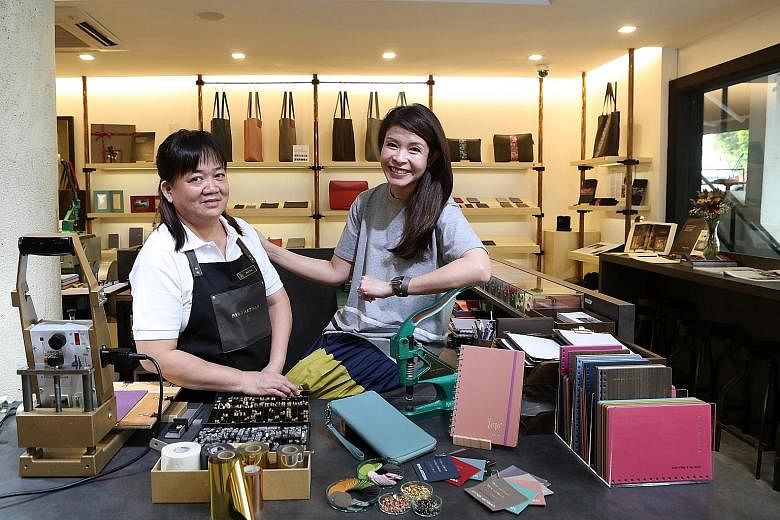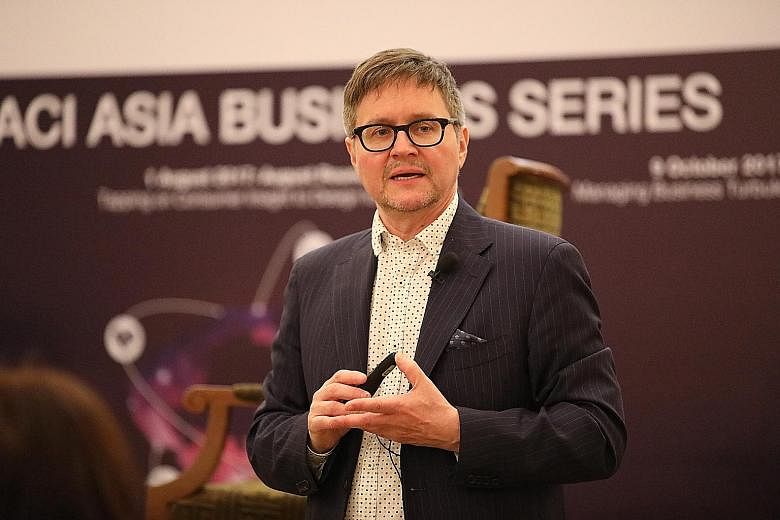A quirky personality is not just for online dating profiles. Brands might have to tell homespun stories to appeal to millennial consumers, especially "indie" shoppers or hipsters on the hunt for hyper-local experiences, says Columbia Business School's Professor Bernd Schmitt.
He tells The Straits Times: "The indie, hipster phenomenon might not be as prevalent yet in Singapore - although you have numerous coffee shops and little design shops and crafts - (but) it's also coming."
This segment of consumers, which is likely to grow in developed markets, strongly prefers "authenticity, often not necessarily trusting a company". Prof Schmitt says they do their own research and want to "shop in a multi-channel, omni-channel environment".
The trends highlighted by Prof Schmitt - who was in town for a roundtable organised by Nanyang Technological University's Institute on Asian Consumer Insight, where he is a special adviser - are already being reflected here, particularly in the use of digital platforms to engage consumers.
A spokesman for Starbucks Singapore says millennials are a key demographic being targeted with a "comprehensive Starbucks digital ecosystem", including a mobile app to help them find stores and pay.
Over at McDonald's Singapore, Ms Agatha Yap, who is senior director of marketing, menu and digital innovations, says: "We've rolled out self-ordering kiosks in about half of our restaurants across Singapore."
She adds: "Many of our younger customers appreciate the freedom of navigating the menu and self-ordering - which also mirrors their online shopping behaviour."
But Prof Schmitt believes there is a significant proportion of millennial consumers who are wary of corporate culture.
He says: "They want to see that a company is authentic, one that they can relate to, that is not covering things up, that is not manipulative and so on."
A preference for small-batch products and unique voices poses a challenge for big brands, which must craft a suitable persona that is "authentic and personal", as Nestle Singapore's marketing communications and corporate affairs director, Mr Chow Phee Chat, puts it.
"We collaborate with popular media platforms to produce tongue-in-cheek, entertaining content that encourages talkability and builds emotional connections with this target audience," he says.
His company's Milo beverage made headlines last year for picking up on singer Nathan Hartono's professed nostalgia for the brand.
A spokesman for BreadTalk Group, which manages the BreadTalk and Toast Box chains, says the firm will "adopt a witty, personable and tongue-in-cheek tone and style in our communications", such as creating anthropomorphic BreadTalk products in ads. And Toast Box recently tweaked its marketing "to appeal to the younger crowd who are 'mobile-living' ".
Corporations looking to shake off an unwillingness to associate with establishment brands can create new brands that are geared to millennials and build strong personalities for them, says Associate Professor of Marketing Hannah Chang from Singapore Management University.
"More and more brands are trying to do this, but it's still not at the maturity stage," she notes.
Meanwhile, the types of small businesses that Prof Schmitt identifies as appealing to millennials have their own challenges.
Ms Winnie Chan, who is chief executive and co-founder of bookbinding atelier Bynd Artisan, says: "The question we are always asking is, how to scale while remaining artisanal... We want to keep it exclusive and limited-edition."
Millennials might have less disposable income and less brand loyalty, but Ms Chan says Bynd Artisan cultivates clients with items at various price points - so they aspire to owning pricier items.
Ms Chan says: "In terms of engaging the young customers of today, it's very experiential... They feel an attachment to the product."
For example, customers might film leather products being made before their eyes, which Ms Chan capitalises on, using lucky draws that encourage them to tag Bynd Artisan when posting to Instagram.
Ms Teresa Foo, who founded natural skincare brand Balm Kitchen, notes that her younger clients might start buying travel-size products and then graduate to bigger sizes.
Ms Foo says that holding do-it-yourself workshops for millennials is another way to tap their love of new experiences.
But Associate Professor Ang Swee Hoon from the National University of Singapore Business School's marketing department warns that companies should not put all their eggs in one basket.
"While the millennials are the new consumers, the pace of technological changes could well see a different profile of consumers sooner than we think."



